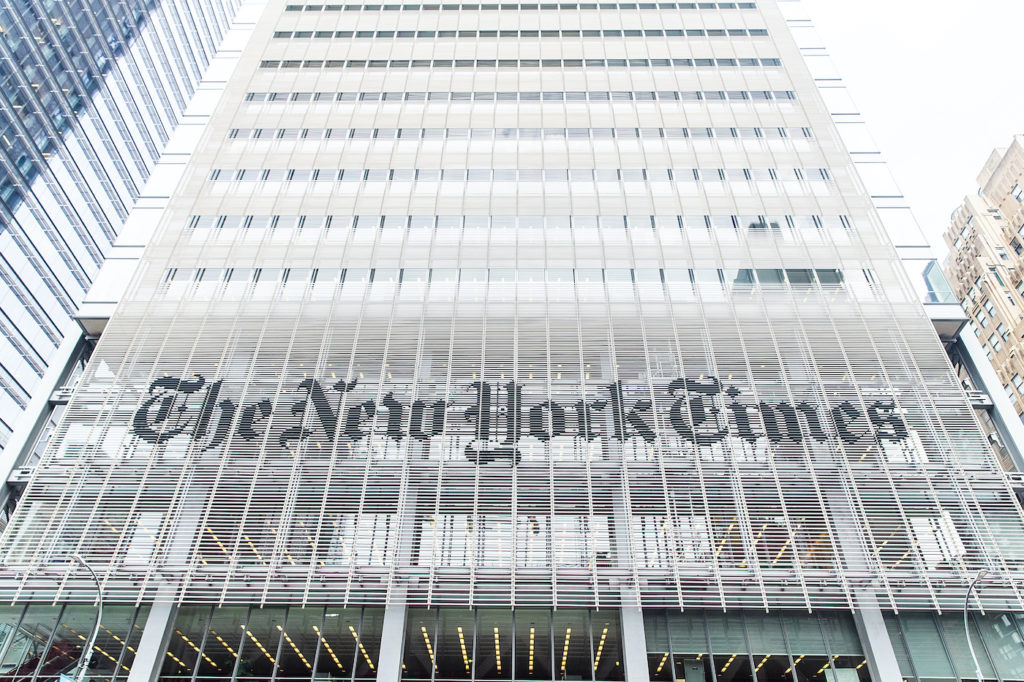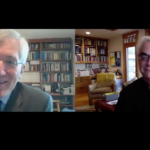The New York Times recently published an op-ed entitled “The Road to Coronavirus Hell was Paved by Evangelicals.” The title was eventually broadened so as to call out “The Religious Right” in general, though the original still appears on Google searches and the main accusation remains front and center. It seems that the Times is doing what human society has too often done in plague time—look for a scapegoat. But amazingly, rather than assigning blame to, say, the Chinese government or some other group more closely linked to the origins of the pandemic, this piece asserts that a certain sort of American Christianity is the culprit.
The author, Katherine Stewart, makes her case, in connection with her upcoming book on the same topic, that what she calls “Christian nationalists” are an increasingly serious threat to the well-being of the United States. While never giving a straightforward definition of Christian nationalism, Stewart argues that such Christians believe America has a special place in divine providence. In addition to this, they are opposed to science and believe that a limited government is commanded by divine law in the Holy Scriptures. These Christians have managed to assume a position of influence in the White House and, according to Stewart, have even shaped the Trump administration’s handling of the COVID-19 outbreak.
This latest warning from Stewart is one of a burgeoning cottage industry of works on “Christian nationalism.” Largely continuous with the much feared but little seen “Dominionism” threat of the 90s and early 2000s, the only thing new about “Christian nationalism” is its relationship to Donald Trump and the accompanying renewed interest in nationalism as a political theory. But it is exactly this relevant distinction that is absent from Stewart’s opinion piece. Though she uses the terms “religious nationalism” and “Christian nationalism,” she nowhere gives any explanation of the nationalistic aspects of this alleged movement. She certainly does not explain how the nationalism of these Christians has any direct relationship to Donald Trump’s strategy for handling the coronavirus crisis.
For conservative religious adherents, this sort of treatment has sadly become the norm. The media’s identifying nomenclature does not seem to be chosen out of interest in describing a concrete group of people and their specific beliefs. Instead, it is more about signalling a sense of social distaste. Just consider the example of the Times’ editorial team in naming this most recent piece. Initially the title called out “Evangelicals.” Then it moved to “the Religious right.”
Start your day with Public Discourse
Sign up and get our daily essays sent straight to your inbox.But who are the specific individuals in question? As it turns out, the list is rather diverse. Among those named are the nineteenth-century Presbyterian Robert L Dabney, Miami “Apostle” Guillermo Maldonado, Roman Catholic activist and author Phyllis Schlafly, Liberty University President and Southern Baptist Jerry Falwell Jr., Secretary of Health and Human Services Alex Azar, Secretary of Housing and Urban Development Ben Carson, and Ohio politician and Family Research Counsel Senior Fellow Ken Blackwell. This is not a list exclusively made up of “Evangelicals.” Indeed, there is at least one Roman Catholic and one Eastern Orthodox Christian present. The Protestants are hardly of a piece either. One is a Seventh-Day Adventist, and one is a Honduran-American Word of Faith minister.
And this last point poses a problem for the new moniker “Christian nationalist.” Guillermo Maldonado does not look much like Steve Bannon, much less Richard Spencer. Indeed, Maldonado’s own website describes his church as “one of the fastest-growing multicultural churches in the United States.” One might expect a more rigorous sort of editor to raise a question or two at this.
Alvin Plantinga once famously defined the term “fundamentalist” as “stupid sumb**** whose theological opinions are considerably to the right of mine.” It may well be time to include the terms “evangelical” and “nationalist” as synonyms in this way. Or maybe that would be unfair to the hoary-haired fundamentalist. Does even he wish to be associated with those catholic-evangelical multicultural-nationalists?
But what of the specific criticisms of being “anti-science” and religiously committed to a minimal government? These are again dismissals rather than serious arguments. There are indeed faith healers who claim miraculous powers, but this in itself says nothing about one’s view of the natural sciences. After all, an appeal to the miraculous is an appeal to something supernatural, something that operates on a different plane than natural causes. One can take issue with these kinds of believers, but doing so requires religious or philosophical argument, not simply an appeal to the physical sciences. After all, if a mere belief in the supernatural prevents a person from being properly scientific, then Georges LeMaître, Gregor Mendel, and other fathers of modern science were unscientific.
In fact, the real question here is not whether people are pro-science or anti-science but rather how they apply the conclusions of the physical sciences to other important decisions. In the case of our current pandemic, a relevant example would be using the many scientific studies about COVID-19 to make an effective political decision. But when we look to the specifics here, we come to some rather surprising findings.
On January 14th of this year, the WHO stated that there was “no clear evidence of human-to-human transmission.” Should world leaders have taken dramatic early political action with that kind of advice? Additionally, the widely-respected health website Stat News argued against the China travel ban. These scientific perspectives were being offered at a time when global containment of the virus may have still been possible. Would a person have been more or less “pro-science” had he or she disagreed with Stat News and instead called for a strict quarantine of the original area of infection? As late as February 1, the Washington Post ran an article with this headline, “Get a grippe, America. The flu is a much bigger threat than coronavirus, for now.” That may perhaps have been a scientifically-informed thing to say on February 1. Two months later it looks like Corona-trutherism. The reality is that “science” does not answer political questions. It can only inform them, and it always does provisionally and in concert with other values and commitments.
But what about the matter of small government? Surely it must be true that right-wing religious people dislike social programs. Everyone knows this to be the case. And yet, while this charge may be relevant to Christians who hold to more classically conservative political views, it does not stick to our new Trump-loving Christian nationalists. After all, Donald Trump very clearly broke with the more libertarian elements in the Republic Party, even shrugging off concerns that his policies might not be properly “conservative.” “This is called the Republican Party, it’s not called the Conservative Party,” he famously said. At one point in his campaign, Trump even espoused support for the single-payer model of government healthcare. Along with this, Trump has championed trade protectionism and domestic production. These policy positions do not line up with Stewart’s description of an ideologically ultra-small government. In fact, in a recent move reminiscent of Harry Truman, President Trump invoked the Defense Production Act to bring the weight of government power down on General Motors. The truth of the matter is that insofar as Trump is distinctively nationalistic, such an inclination makes him more favorable toward a larger central government.
There is indeed a growing interest in forms of “nationalism” among conservative thinkers, though not only among Christians. Yoram Hazony’s The Virtue of Nationalism has received wide acclaim and numerous awards. Rusty Reno, editor of First Things, has pivoted from an older model of fusing traditional conservativism with libertarianism towards a sort of religiously inspired nationalism. And of course, there’s the case of Steve Bannon, whose “economic nationalism” struck fear in the hearts of journalists across the country. These nationalists are not united in their understanding of religion and philosophy. Hazony is Jewish and has an admiration for Edmund Burke. Reno is a Roman Catholic whose magazine has had a growing interest in illiberal sorts of Catholic integralism. Bannon is something of a cultural Catholic, but hardly seems interested in the things of piety. What all of these versions of nationalism have in common is an interest in using government power to promote the common good of the nation and to protect the people of that nation from the potentially damaging effects of an open world market. This means that they strongly believe in a “bigger government” than did Republican thinkers of a previous generation.
A nationalist of this sort might well have a few thoughts on the appropriate response to a global pandemic. Such a person might suggest that an early quarantining of one nation—for instance, limiting travel in and out of China in December or January—would have been preferable to a worldwide lockdown in March and April. They might also suggest that crises of this sort show the folly of outsourcing the production of essential goods, especially health, medical, and pharmaceutical products. A certain sort of nationalist might even inquire to what extent the Chinese government’s suppression of vital information is responsible for our current economic shutdown and thus to what extent that same government should be held liable.
These would all be eminently reasonable questions for a more nationalistic sort of thinker to ask. And these are also the kinds of questions that are likely to be rebuffed as coming from those unsavory characters, the far right, or the evangelicals, or the Christian nationalists—you know the type. But when such opposition does arise, we should point out that there is nothing at all scientific about it. No, the shutting down of such questions instead derives from deeply-held personal values and ideological commitments. It comes from a sort of faith tradition, a faith in collective humanity, international travel, and free exchange. Time will tell whether such a faith can remain vibrant.
The Jewish and Christian Scriptures do teach that times of great affliction are also times of testing. Such times reveal previous sins that had not been confessed, and help to instill the virtues of perseverance, character, and hope. Perhaps this current time of affliction can likewise encourage us to put away the bad habits of scapegoating our ideological opponents and reducing complex global problems to simplistic, culture-war talking points that only reinforce the prior assumptions of our favored audience. And perhaps as this time of testing purges away the dross, it can also help us to ask better and more interesting questions, open up more categories for discussion, and equip our real-world political choices with more specific and accurate policies.














